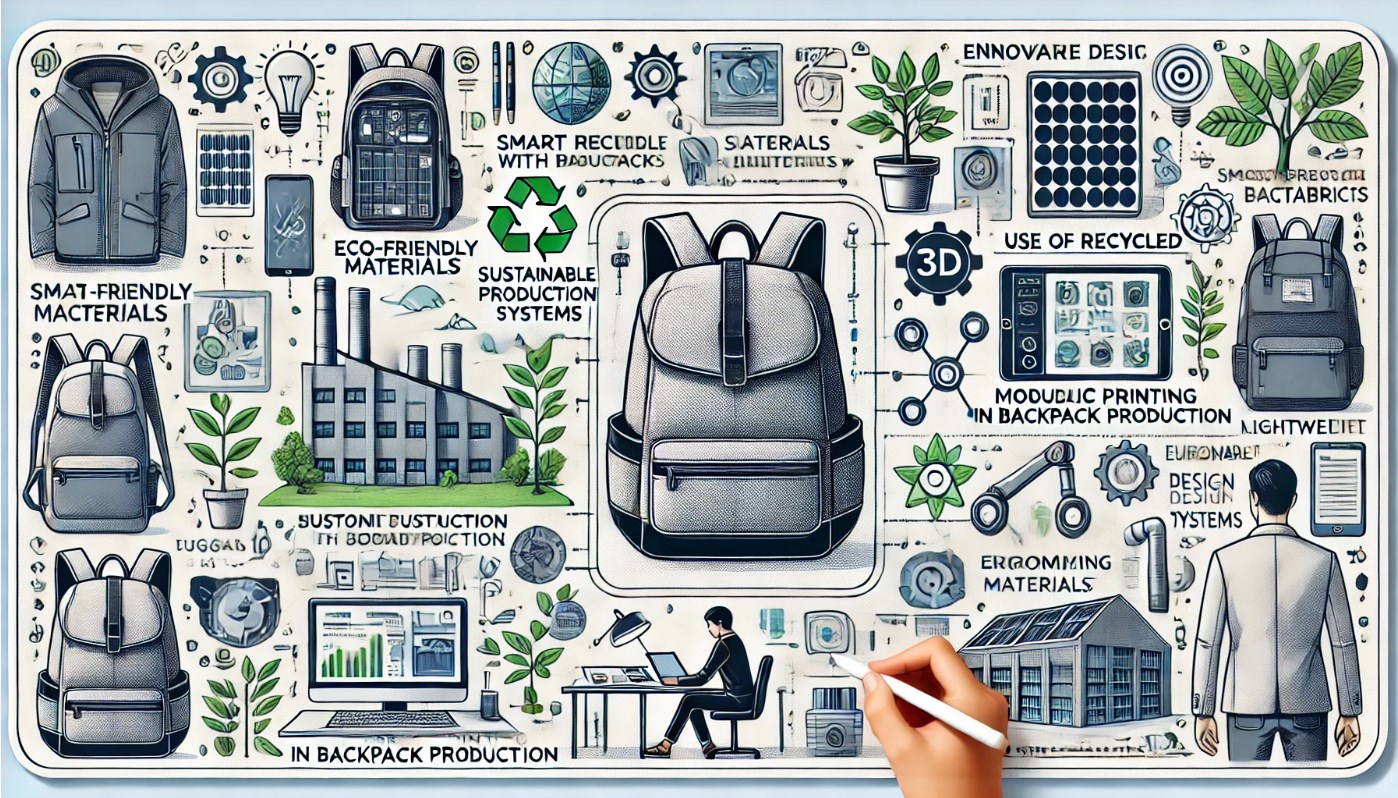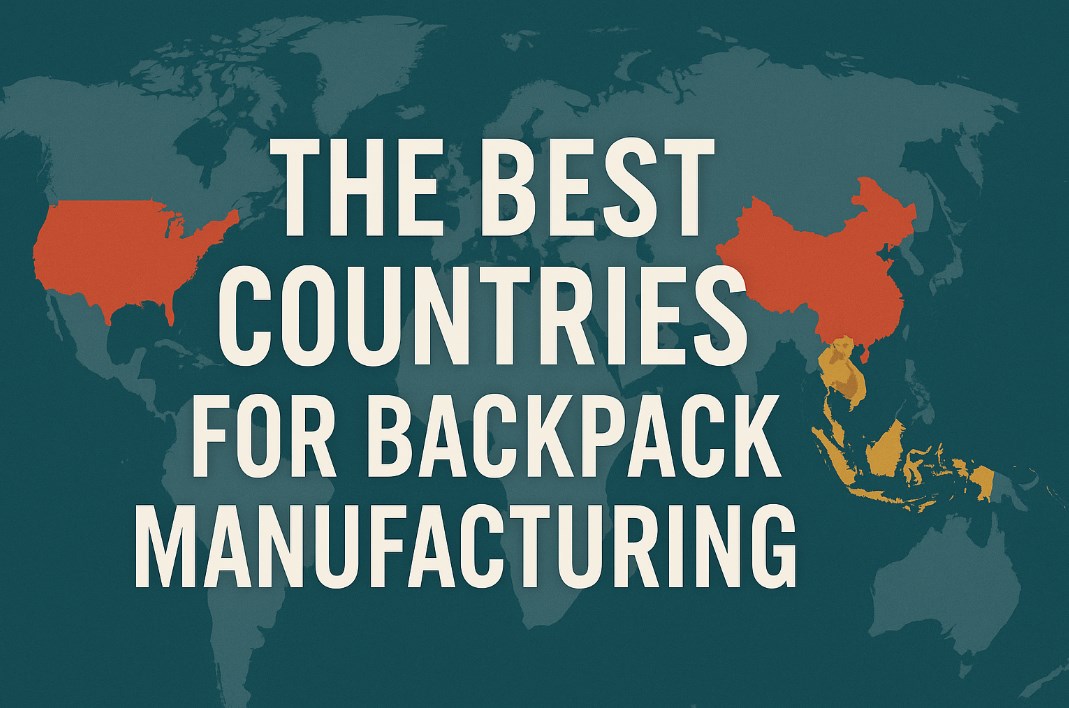Ethical manufacturing is an increasingly important consideration in today’s global supply chain. As consumers and businesses become more conscious of the environmental and social impact of their purchasing decisions, ensuring that products are made under ethical conditions has become a priority. When sourcing backpacks, evaluating the ethical practices of a factory is essential to building a responsible and sustainable supply chain.
Defining Ethical Manufacturing
Ethical manufacturing refers to the production of goods under conditions that promote fairness, human rights, environmental sustainability, and social responsibility. For the backpack industry, this means ensuring that factories not only comply with basic labor laws but also operate in a way that respects workers’ rights, minimizes environmental damage, and promotes sustainability.
The ethical considerations surrounding backpack manufacturing span various aspects of the production process, from the sourcing of raw materials to working conditions, waste management, and community impact. Businesses that prioritize ethical manufacturing are aligning their operations with consumer expectations for responsibility, which in turn can enhance brand reputation, build consumer loyalty, and contribute to the greater good.
The Growing Importance of Ethical Manufacturing in the Backpack Industry
Backpacks are products used daily by millions of people, and their production process can have a significant impact on both the environment and the people involved in manufacturing. In recent years, concerns over working conditions in factories, environmental degradation due to non-sustainable production practices, and the exploitation of workers have gained increasing attention in the global supply chain.
As consumers demand more sustainable and ethical products, brands that source backpacks from factories with strong ethical standards can differentiate themselves in a crowded market. Brands that prioritize ethical manufacturing are more likely to build trust and loyalty with eco-conscious customers and those concerned about fair trade and human rights.
Key Criteria for Evaluating Ethical Manufacturing Practices
Labor Rights and Fair Working Conditions
One of the fundamental aspects of ethical manufacturing is ensuring fair and humane treatment of workers. For backpack factories, this includes providing safe working conditions, paying fair wages, and ensuring that workers are treated with respect and dignity.
Wages and Compensation
Ethical factories should provide workers with fair wages that meet or exceed the legal minimum wage in their country of operation. However, minimum wage compliance alone is not enough. Ethical factories should also offer a wage that allows workers to meet their basic living expenses and provide for their families.
In some regions, workers in the garment and accessory industries are paid below the poverty line, forcing them to work excessively long hours to make ends meet. Ensure that the factory adheres to fair compensation practices, which include:
- Living Wage: A living wage ensures that workers can support themselves and their families, covering basic needs like food, healthcare, and education.
- Overtime Pay: Ethical factories should offer reasonable overtime pay for extra hours worked, in line with local labor laws.
- Benefits: Providing health insurance, paid leave, and retirement benefits is a sign that a factory is prioritizing workers’ well-being.
Health and Safety Standards
The physical safety of workers should be a top priority in any manufacturing setting. Ethical factories must adhere to strict health and safety standards, ensuring that workers are not exposed to hazardous conditions or dangerous machinery. Safety protocols should include:
- Safe Work Environments: Factories should have clean and well-lit working areas, proper ventilation, and safe working conditions to minimize the risk of accidents and health hazards.
- Training and Safety Gear: Workers should be provided with safety training and personal protective equipment (PPE) such as gloves, masks, and aprons, especially if they are working with hazardous materials or machinery.
- Emergency Procedures: Ethical factories should have clear emergency evacuation plans and trained personnel on-site to manage workplace accidents.
Forced Labor and Child Labor
One of the most serious ethical concerns in manufacturing is the use of forced labor and child labor. Ethical factories must be free from any form of exploitation, coercion, or forced work. This includes:
- Zero Tolerance for Child Labor: Ethical factories should not employ workers under the legal working age, and there should be systems in place to verify workers’ ages during the hiring process.
- Freedom of Movement: Workers should not be subjected to any form of coercion, including withholding of documents, wages, or personal freedom.
- Voluntary Work: All workers should have the right to leave their jobs at any time, without fear of retaliation or punishment.
Environmental Impact and Sustainability
Environmental sustainability is a key pillar of ethical manufacturing. The environmental impact of the manufacturing process can include waste, pollution, water usage, and the carbon footprint of transporting raw materials and finished goods. Ethical factories should take steps to reduce their environmental footprint and use sustainable practices in the production of backpacks.
Material Sourcing
Backpack manufacturing typically involves a wide range of materials, including fabrics, zippers, buckles, and other hardware. Ethical factories should prioritize sustainable material sourcing, which includes:
- Eco-Friendly Materials: Look for factories that use recycled materials, organic cotton, or other sustainable fabrics. Some factories may also offer backpacks made from materials like upcycled plastic bottles, which help reduce waste.
- Fair Trade Certification: Some factories may be certified by fair trade organizations, ensuring that raw materials are sourced in a way that supports local farmers and communities.
- Non-Toxic Dyes and Chemicals: Ethical factories should avoid the use of harmful chemicals in the manufacturing process, such as toxic dyes or heavy metals that can pollute the environment and harm workers.
Waste Management and Recycling
Ethical factories should have systems in place to manage waste, including reducing, reusing, and recycling materials. A commitment to minimizing waste includes:
- Recycling Programs: Factories should recycle materials such as fabric scraps, plastic components, and metal hardware whenever possible. This can help reduce landfill waste and limit the environmental impact of production.
- Energy Efficiency: Ethical factories should use energy-efficient machinery, lighting, and heating systems to reduce their carbon footprint. Some factories may even use renewable energy sources, such as solar power, to power their operations.
- Wastewater Treatment: Factories that use water in their production processes should have wastewater treatment systems in place to prevent pollution of local water sources.
Carbon Footprint and Transportation
The carbon footprint of transporting raw materials and finished products is another environmental concern. Ethical factories should strive to reduce transportation emissions by sourcing materials locally, optimizing supply chain routes, and reducing the need for long-distance shipping. Many factories are working to offset their carbon emissions by investing in carbon credit programs or adopting more sustainable transport options.
Transparency and Supply Chain Traceability
Transparency is a critical aspect of ethical manufacturing. Ethical factories should be open about their production processes, sourcing practices, and labor conditions. They should be willing to share information about their operations, including third-party audits and certifications, and make it easy for customers to verify their claims.
Third-Party Audits and Certifications
One of the most effective ways to evaluate the ethical practices of a backpack factory is by reviewing their third-party audits and certifications. These audits, conducted by independent organizations, assess the factory’s compliance with international labor standards, environmental practices, and business ethics.
Common certifications to look for include:
- SA8000: This certification focuses on labor standards, ensuring that factories comply with ethical practices such as no child labor, no forced labor, and fair wages.
- ISO 14001: A certification for environmental management that ensures the factory is adhering to sustainable practices and minimizing its environmental impact.
- Fair Trade Certification: Fair trade certification ensures that raw materials are sourced ethically, and workers are paid fairly for their labor.
- GOTS (Global Organic Textile Standard): A certification that ensures products made from organic fibers meet strict environmental and social criteria.
Supply Chain Traceability
Transparency in the supply chain ensures that the materials used to make backpacks are sourced ethically and sustainably. Ethical factories should be able to trace the origin of their raw materials and provide clear information about where and how they are sourced.
You can request documentation from your supplier that verifies their sourcing practices. This may include certificates of origin, proof of fair trade certification, and reports from third-party audits.
Evaluating Factory Conditions
Visiting the Factory in Person
While online audits and certifications can provide valuable insights, nothing beats visiting the factory in person to assess its operations. A factory visit allows you to:
- See Working Conditions Firsthand: Visiting the factory lets you observe the working environment and speak directly with workers to assess their satisfaction and working conditions.
- Verify Ethical Practices: You can ask factory management questions about their labor practices, environmental efforts, and safety measures.
- Build Relationships: A personal visit helps build trust and establishes a more direct line of communication between you and the factory, which is essential for resolving any future issues.
Conducting a Social Compliance Audit
If a factory visit isn’t feasible, consider hiring a third-party auditing company to conduct a social compliance audit. These companies specialize in evaluating factories based on a variety of ethical criteria, including labor rights, working conditions, and environmental impact. A comprehensive audit can help you assess whether a factory meets your ethical standards before entering into a partnership.
Ongoing Monitoring and Relationship Building
Continuous Monitoring of Ethical Practices
Once you’ve established a relationship with a factory, it’s important to maintain ongoing monitoring of their ethical practices. This includes periodic audits, factory visits, and maintaining open communication with factory management to address any concerns promptly.
You should also stay up to date with changes in local labor laws, environmental regulations, and industry standards, ensuring that your supplier remains compliant with any new regulations or ethical guidelines.
Building Long-Term Relationships with Ethical Factories
Building long-term relationships with ethical factories is key to ensuring that ethical practices are maintained over time. Strong relationships foster trust and collaboration, making it easier to address any challenges or changes that arise. By supporting ethical suppliers and working together to improve their practices, you can create a positive impact on the entire supply chain.







